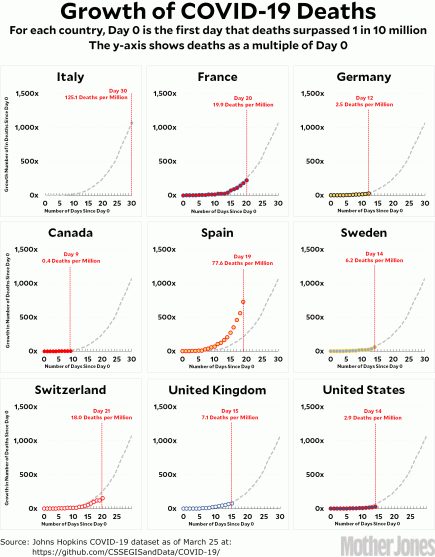This article was last updated on March 27.
As of March 17, coronavirus cases have been officially reported in all 50 states. State governments’ responses to the pandemic have rolled out at different speeds and on a range of scales. While all states have declared a state of emergency and nearly all have closed schools, limits on public gatherings and non-essential businesses are not universal. These maps, built with data from the National Governor’s Association, American Enterprise Institute, and Mother Jones‘ own research, track actions taken at the state level to address the spread of the coronavirus.
We will update these maps as new data becomes available.
All 50 states, Puerto Rico, and Washington, DC, have declared a state of emergency.
Declaring a state of emergency means different things in different states. For example, California’s emergency declaration includes provisions to prevent price gouging and allow out-of-state health care workers to work in the state, while Idaho’s declaration gives the governor flexibility to expedite the purchase of emergency supplies.
More than a dozen states have told residents to stay home…
Stay-at-home orders vary: Georgia’s is for the medically fragile only; Oklahoma’s is for vulnerable populations only and puts a 10-person limit on gatherings for all others; Pennsylvania’s is for 8 counties; Nebraska’s limits apply to seven counties; Florida has issued stay-at-home guidance for people over 65 years old.
…but limits on social gatherings vary widely.
Several states have asked residents to stay at home and minimize non-essential movement outside, while some states have tried to encourage social distancing with limits on the maximum size of public gatherings.
Most states have closed schools
Nine states have postponed primary elections.
Nine states and Puerto Rico have postponed their upcoming primary elections, mostly to June. Alaska, Wyoming and Hawaii are still going forward with primaries scheduled for April 4, but have said they’re closely monitoring the situation.
Many states have required non-essential businesses to close.
States define non-essential businesses differently. In Missouri, only casinos have been asked to shut down. In Florida, gyms have been asked to shut down. In Arizona and Oklahoma, non-essential businesses are closed only in counties with coronavirus cases. In addition to closing non-essential businesses, many states prohibit workers to come into work at a non-essential business, encouraging telecommuting.
A majority of states have put limits on restaurants and bars
More than half of all states have ordered restaurants and bars to end in-dining services. Takeout and delivery services are still allowed.
A few states have asked residents to postpone elective surgeries.
States including Ohio and Texas have seized the opportunity to classify abortions as elective procedures.
A majority of states have restricted out-of-state travel for state employees.
Many states have asked state employees to restrict domestic and international work-related travel.

















